As a collaborative network the TeaComposition initiative involves high-level experimental and global research networks making it possible to quantify litter carbon turnover at a high resolution both temporally and spatially, capitalizing on local data to elucidate the abiotic and biotic drivers of decomposition processes relevant for increasing our mechanistic understanding of decomposition processes.
ILTER consists of networks of scientists engaged in long-term, site-based ecological and socioecological research. The implementation of the TeaComposition initiative is supported through an annual initiative grant.
Number of sites:365
Contact: Michael Mirtl
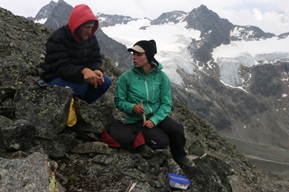
The Global Observation Research Initiative in Alpine Environments (GLORIA), founded at the turn of the century, is an internationally operating site-based monitoring network and research programme aiming to detect climate-driven impacts on high mountain vegetation and its biodiversity. Although GLORIA’s generally applied standard approach focuses on plant species, the network also serves as nexus for studies of other organism groups and across research disciplines. Important ecosystem components in the context of climate change are biotic activities in alpine soils, being crucial for the decomposition rate of organic material. GLORIA therefore collaborates with the Global Litter Decomposition Study ‘TeaComposition. In 2016, GLORIA teams on several continents have inserted teabags from the same production-run into alpine soil near the standard monitoring plots, i.e. four summit sites in each of the study regions, situated at different elevations between the treeline ecotone to the upper zone where plants occur. Over a three year period, subsets of teabags will be retrieved at annual intervals for measuring the degree of decomposition of tea material. In addition soil samples were taken. Through the collaboration with the international TeaComposition study, potential soil decomposition rates will be made comparable with soil and vegetation composition across different biomes and climate zones.
Number of sites: 27 sites (with each 4 summits)
Contact: Harald Pauli
INTERACT is a circumarctic network, which seeks to build capacity for research and monitoring in the European Arctic and beyond. The implementation of litter decomposition in the arctic region was supported through a remote TA access within INTERACT Network (EU H2020 Grant No. 730938).
Number of sites:10
Contact: Terry Callaghan
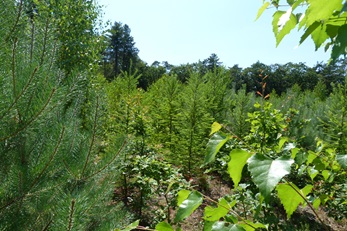
TreeDivNet is a global network of tree diversity experiments, which provides a unique platform for research on the relation between tree species diversity and ecosystem functioning in major forest types around the world. Within TreeDivNet experiments we investigate the effects of tree biodiversity on the litter decomposition.
Number of sites: 16
Contact: Kris Verheyen
Terrestrial Environmental Observation Infrastructure (TERENO) aims to investigate the consequences of Global Change for terrestrial ecosystems. The established of TeaComposition study within this existing infrastructure will help also to address some of the key drivers of litter decomposition.
Number of sites: 5
Contact: Ralf Kiese
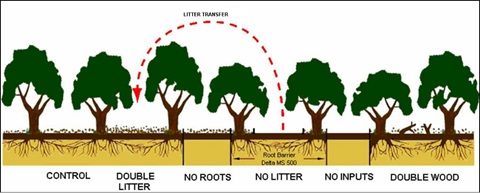
The Detrital Input and Removal Experiment network (DIRT) assess how rates and sources of plant litter inputs control the long-term stability, accumulation, and chemical nature of soil organic matter in forested ecosystems. The established set-up will allow to quantify the link of above-ground and below-ground litter input on the leaf litter decomposition.
Number of sites: 3
Contact: Kate Lajtha
The COST action ClimMani (ES1308) has contributed a strong platform for discussions of the need for common metrics in experimental science and through short term travel grants facilitated discussions and fine tuning of methodology and data handling.
Number of sites: 18
Contact: Claus Beier
TeaComposition H2O, is a global-scale initiative of litter decomposition within aquatic ecosystems led by the Blue Carbon Lab’s Drs Peter Macreadie and Stacey Trevathan-Tackett from Deakin University in Australia (http://bluecarbonlab.org/). It applies protocols and templates developed within TeaComposition initiate and uses batch of tea provided by Unilever.
Number of sites: 350
Contact: Stacey Trevathan-Tackett
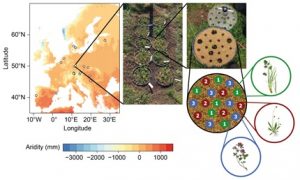 A central goal in ecosystem ecology is disentangling co-occurring drivers of ecosystem processes such as decomposition rates and biomass production. Standardized common metrics can isolate these drivers to provide background rates of these processes in model systems. The Bayreuth Phytometer is a common metric being developed for plant community ecology that uses a standardized plant community-substrate unit alongside the same plant community grown in local soils to determine relative influences of climate and soils in driving biomass production. In 2017 these phytometers will be exposed across Europe as part of the ClimMani COST action network of climate change research. Teabags are being added to this year’s phytometers and will be harvested and reweighed after one year of exposure. By linking the TeaComposition initiative with the Bayreuth Phytometer, we can compare decomposition rates in standardized substrate phytometers to local soil substrate phytometers to better understand the relative roles of local soils in breaking down organic matter. Furthermore, we can see climatically driven background rates of decomposition in the standardized substrate phytometers which will initially be uncolonized by local soil fauna. Finally, this will allow researchers to link the fundamental process of litter decomposition across sites and within their own experimental setups using the common background of the phytometers.
A central goal in ecosystem ecology is disentangling co-occurring drivers of ecosystem processes such as decomposition rates and biomass production. Standardized common metrics can isolate these drivers to provide background rates of these processes in model systems. The Bayreuth Phytometer is a common metric being developed for plant community ecology that uses a standardized plant community-substrate unit alongside the same plant community grown in local soils to determine relative influences of climate and soils in driving biomass production. In 2017 these phytometers will be exposed across Europe as part of the ClimMani COST action network of climate change research. Teabags are being added to this year’s phytometers and will be harvested and reweighed after one year of exposure. By linking the TeaComposition initiative with the Bayreuth Phytometer, we can compare decomposition rates in standardized substrate phytometers to local soil substrate phytometers to better understand the relative roles of local soils in breaking down organic matter. Furthermore, we can see climatically driven background rates of decomposition in the standardized substrate phytometers which will initially be uncolonized by local soil fauna. Finally, this will allow researchers to link the fundamental process of litter decomposition across sites and within their own experimental setups using the common background of the phytometers.
Number of sites: 18
Contact: Peter Wilfahrt
Climosequences
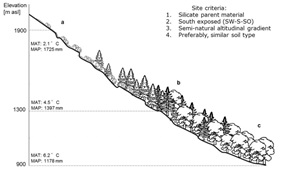 To investigate the long-term litter decomposition initiative across 9 zonobiomes in alpine ecosystems and its key drivers under present and future climate scenarios using a climosequence approach. Climosequence are sequences of soil whose variations are caused by climate and associated vegetation. All other parameters (parent material, soil type, exposition etc.) are kept similar so that observed changes can be attributed to the local climate and vegetation.
To investigate the long-term litter decomposition initiative across 9 zonobiomes in alpine ecosystems and its key drivers under present and future climate scenarios using a climosequence approach. Climosequence are sequences of soil whose variations are caused by climate and associated vegetation. All other parameters (parent material, soil type, exposition etc.) are kept similar so that observed changes can be attributed to the local climate and vegetation.
Number of sites: 9
Contact: Ika Djukic
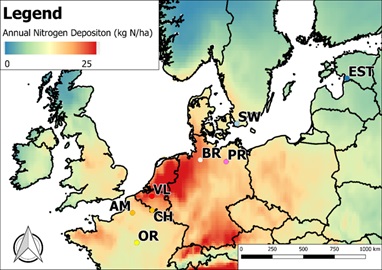 The decomposition of plant and leaf litter is a central process in the functioning of forest ecosystems, forming a link between abiotic conditions and many other biotic processes. Litter decomposition is, however, a complex process that is potentially altered by multiple global changes such as climate warming, and nitrogen (N) deposition. Environmental changes could have occurred on a local scale as well: the legacy of past (agricultural) land use can still affect present soil composition and dynamics through elevation of nutrient stocks, and particularly Phosphorus (P). These environmental changes can potentially interact with the effects of current forest management, where a more intensive management implies a higher light availability. We designed a multi-factor mesocosm experiment to disentangle interactive effects of warming (T), N addition (N), increased light availability (L) and land-use legacy on model herb layer communities and their ecosystem functions. Forest soil was collected from eight European regions across a latitudinal gradient, ranging from Southern Estonia to central France. In each region, we collected soil from three post-agricultural (recent) and three ancient forests that were occurring in the same landscape. The herb layer communities growing on these soils were selected for their differences in plant functional traits, reflecting their affinity with either ancient or post-agricultural forests. In this field experiment, we test the hypothesis that litter (replaced by green tea and rooibos tea) decomposition rates are increased in the experimental treatments where resources and growth conditions are elevated. Therefore, we buried 1728 tea bags in 384 experimental units according to the design below. Design:
The decomposition of plant and leaf litter is a central process in the functioning of forest ecosystems, forming a link between abiotic conditions and many other biotic processes. Litter decomposition is, however, a complex process that is potentially altered by multiple global changes such as climate warming, and nitrogen (N) deposition. Environmental changes could have occurred on a local scale as well: the legacy of past (agricultural) land use can still affect present soil composition and dynamics through elevation of nutrient stocks, and particularly Phosphorus (P). These environmental changes can potentially interact with the effects of current forest management, where a more intensive management implies a higher light availability. We designed a multi-factor mesocosm experiment to disentangle interactive effects of warming (T), N addition (N), increased light availability (L) and land-use legacy on model herb layer communities and their ecosystem functions. Forest soil was collected from eight European regions across a latitudinal gradient, ranging from Southern Estonia to central France. In each region, we collected soil from three post-agricultural (recent) and three ancient forests that were occurring in the same landscape. The herb layer communities growing on these soils were selected for their differences in plant functional traits, reflecting their affinity with either ancient or post-agricultural forests. In this field experiment, we test the hypothesis that litter (replaced by green tea and rooibos tea) decomposition rates are increased in the experimental treatments where resources and growth conditions are elevated. Therefore, we buried 1728 tea bags in 384 experimental units according to the design below. Design:
8 regions × (3 ancient + 3 recent forests) × 2 T × 2 L × 2 N × (2 green tea bag + 2 rooibos tea) + 192 extra tea bags on soil with highest contrast in past land use)
Contact: Kris Verheyen
Biodiversity Exploratories project
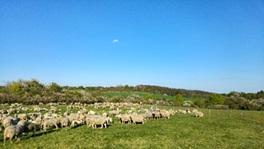 Within the framework of the Biodiversity Exploratories project in Germany, a large-scale plant diversity experiment in temperate grassland ecosystems has been established (http://www.biodiversity-exploratories.de/1/projects/derzeit-gefoerdert/pflanzen/sade/) to address questions of ecosystem resilience and of effects of increased plant diversity and how both may change ecosystem functioning, such as litter decomposition within the TeaComposition project.
Within the framework of the Biodiversity Exploratories project in Germany, a large-scale plant diversity experiment in temperate grassland ecosystems has been established (http://www.biodiversity-exploratories.de/1/projects/derzeit-gefoerdert/pflanzen/sade/) to address questions of ecosystem resilience and of effects of increased plant diversity and how both may change ecosystem functioning, such as litter decomposition within the TeaComposition project.
Contact: Valentin H. Klaus
UNILEVER
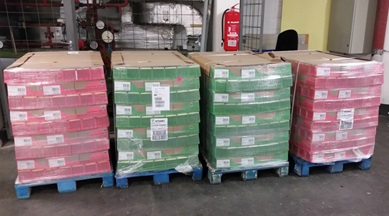 UNILEVER, the company that produces the Lipton tea, is sponsoring the "TeaComposition" initiative, so that all sites will receive the same batch of tea and hence assuring the primary criteria of having the same substrate quality for all sites. UNILEVER has supplied 63.000 teabags of Roiboos and Green Tea.
UNILEVER, the company that produces the Lipton tea, is sponsoring the "TeaComposition" initiative, so that all sites will receive the same batch of tea and hence assuring the primary criteria of having the same substrate quality for all sites. UNILEVER has supplied 63.000 teabags of Roiboos and Green Tea.
